Mthunzi Centre
Mthunzi Centre was founded by the Koinonia Community in an effort to assist the countless children in Lusaka, Zambia, and its environs, who are exposed to various dangers that hamper their growth.
Mthunzi is situated on the Koinonia Community land, on a farm about 15 Km from Lusaka city centre. Mthunzi houses 67 such children. The seven Zambian families who also live on the same land give children the opportunity to grow in an environment where there are adults who love and care for them, while providing access to their basic needs.
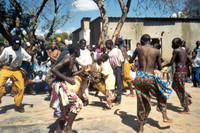
The Centre strives to respond to the needs of children in difficult situations, especially street children, orphans and the neglected. The main aim of the Mthunzi initiative can be summarized in one line:
To respond holistically to the needs of children in difficult situations, assisting them to grow into responsible and reliable citizens.
Other objectives are:
- To provide care and protection for vulnerable children under our care.
- To provide them with the means to attain a basic education.
- To network with other organizations working in the same field, in Zambia as well as abroad, in order to provide an ever improving service to the children.
- To provide medical services to resident children at the Centre and others from the community around.
- To foster human and spiritual development for all the children and youth who come to Mthunzi.
The centre has Four components:
a) A Residence for former street children
b) Home-based sponsorship
c) Skills enhancement and entrepreneurship training
d) Psychological and human development support
a) Residence for Former Street Children
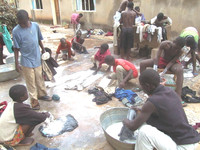
The residence can accommodate up to 70 children. In most cases, the children come to the Centre from the streets of Lusaka after being found and befriended by Mthunzi staff. Some are referred to the Centre by government social workers and other nongovernmental organizations, while in certain cases, the children come on their own initiative.
After being admitted, the children stay at the Centre for a few weeks, attending a crash rehabilitation programme, following which they are integrated into a nearby government school called Tubalange.
Two basic criteria are used to select children for residence at the Mthunzi Centre: their needs, and a willingness to live at Centre. No child is in any way forced to live at Mthunzi. Instead, the choice to take up residence at the Centre is freely made by the child.
While in residence, the children are cared for by a group of adults. They have regular meals as a family, get clothed, sent to school and receive medical attention when needed. They have time to play and visit their friends and schoolmates in the area, while counseling and remedial lessons are provided for those who need them.
The performance of the children at Tubalange School is generally rated as ‘excellent’, and some of the resident children have regularly featured at the top of their classes.
Where possible, the children are encouraged and assisted to stay in touch with their relatives, in view of their future reintegration into these families of origin.
Sports (football, volleyball, acrobatics) and cultural activities (drama, traditional dances) are incorporated into the daily lives of the resident children, which makes Mthunzi a place full of life and laughter.
The children are also encouraged to take the responsibility of receiving visitors as their own guests. Come and experience their warm welcome!
b) Home-Based Sponsorship
There is a big number of children languishing in Lusaka West, where Mthunzi Centre is situated. Most have lost their parents to AIDS and live with a grandparent or a guardian. Even though they may have a relative or guardian taking care of their needs in terms of loving attention and food, many of these children do not go to school because their guardians cannot afford to pay for such requirements as school uniform, books and school shoes.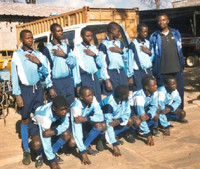
Mthunzi Centre, with the help of overseas friends who "adopt" a child, provides the chance for more than fifty children, most of them girls, to attend school every year.These children continue to live with their guardians, but every Saturday, they come to Mthunzi for a nutritious meal, as well as to update the staff on their academic progress and express their needs. The children also have access to Mthunzi medical facilities when needed.
Mthunzi staff members, meanwhile, monitor the growth of the children through constant contact with their school teachers and guardians.
c) Skills Enhancement and Entrepreneurship Training
In an effort to nurture self-supporting persons, Mthunzi Centre offers training in different trades and entrepreneurial skills to young people living in the Centre’s immediate neighborhood. This includes area residents, children under home-based sponsorship and any other interested persons.
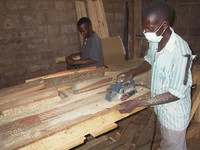
At present, the young adults are trained in wood carpentry and tailoring. They undergo a trade test from the Examination Council of Zambia at the end of the courses. When they become ready to start their own workshop, they are provided with the most basic tools needed in their trade.
About twenty Mthunzi boys are participating in informal training in agriculture and auto mechanics, so that they can acquire life survival skills. There are plans to make this training formal, with the acquisition of a certificate or diploma.
The following is a summary of the programmes pursued at Mthunzi Centre:
Category |
Number |
Services Provided |
Residence for former street children. |
67 (only boys) |
|
Home-based sponsorship. |
50 (mainly girls) |
|
Skills enhancement and entrepreneurship training. |
30 (boys and girls) |
|
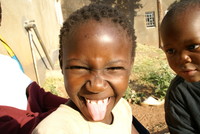
d) Psychological and Human Development Support
This is a cardinal activity. Without proper rehabilitation, the children will not perform well in school and in life in general.
After a long time in the street, troubled children usually acquire self-destructive behaviours that may include smoking, drinking, indiscipline, violence, stealing, lying and a generally low moral standard.
Mthunzi Centre, through counseling, helps such children come to terms with their past and nurtures in them behaviour that is socially acceptable.
Recreation and entertainement
Recreation has an important role in the life of a child, especially in the developmental stages. The Centre provides the children with ample opportunities for recreation and interaction with other children of their age.
The Mthunzi Cultural Club, a group of about 30 resident children, can put up a two-hour show with dancing, singing, drumming, acrobatics, miming, juggling. The shows mostly convey messages related to HIV-AIDS prevention, peace and brotherhood. The club is often invited to perform for schools, associations and parishes.
Home visits
Before a child is admitted into the Centre’s rehabilitation programme, a visit to his original home is arranged. The aim of this visit is to know the child better and understand his background, so that the most appropriate interventions for his betterment can be made.
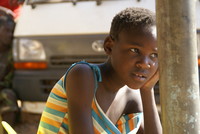
Later on, the child is periodically accompanied to visit his guardians or relatives, which ensures that a positive relationship remains between the child and the family of origin. This relationship becomes of great importance when the child is eventually reintegrated back into the family upon completion of the rehabilitation process.
Counselling and guidance
Staff from Mthunzi Centre are with the children at all times, listening to them and providing the love and care they previously lacked. Counseling and guidance sessions are done in small family-like groups, and where need arises, the services of external professional counselors are sought.


